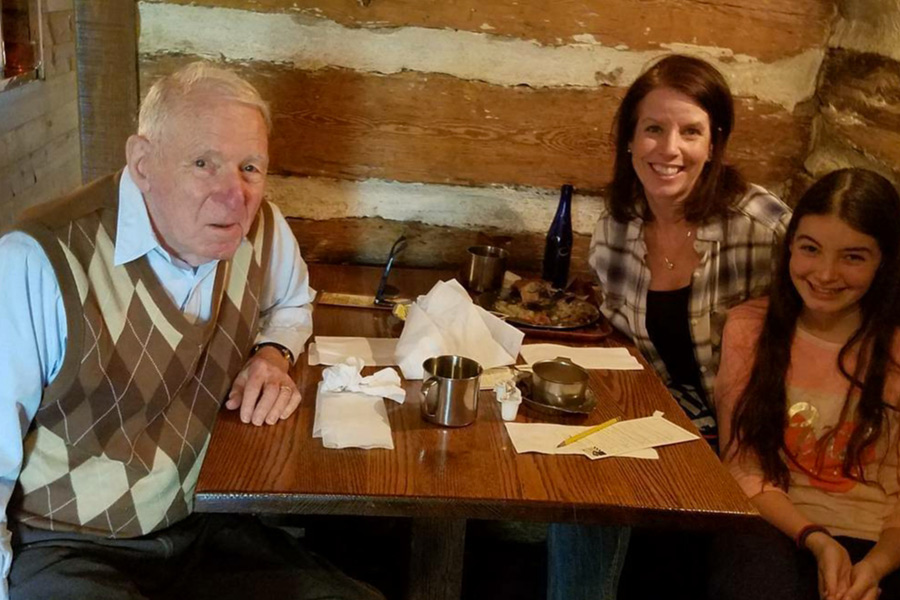“It’s one thing to connect with patients on a professional level when it comes to dementia,” explains Rita Grandelis, LCSW, CCM, CDP, Director of Geriatric Care Management at Unicity Healthcare, “but it’s another for these individuals and their families to know that I, too, am currently navigating this complex disease with my 88-year-old father, Patrick.”
Dementia, as defined by Rita, is a disorder in which an abnormality and/or permanent death of nerve cells occurs in the brain therefore impairing the organ and prohibiting it from functioning properly. “It’s a disease that impacts a huge population,” she adds.
In fact, according to the American Speech-Language-Hearing Association (ASHA), approximately 5.7 million people in the United States are living with dementia—and these numbers are expected to rise as life expectancy increases.
“It’s also progressive,” the expert elaborates, “meaning that the symptoms worsen over time on a unique basis for each individual.”
The stages of dementia
As noted by Rita, who has been managing her father’s diagnosis for over 5 years, dementia can be medically classified into 7 defined stages, ranging from stage 1 (no symptoms) to stage 7 (incredibly severe). “These stages, though, can be very confusing and truthfully a little overwhelming for patients and their families,” she shares. “It’s trying to be too specific for a not-so-specific and cookie cutter disease.”
Instead, Rita and other healthcare professionals prefer breaking down the stages of dementia into mild, moderate and severe as it’s “a bit more digestible this way,” she describes:
- Mild. This stage is related to short-term memory loss in terms of forgetting simple words and phrases, misplacing objects or asking repetitive questions. “In this stage, individuals have trouble finishing simple tasks such as brushing teeth or even putting on their clothes,” Rita says.
- Moderate. “The transition from mild to moderate is marked by a big increase in memory loss, disorientation and confusion,” the expert says. In this stage, individuals may not be able to recognize their family or friends—which can be incredibly frustrating for caregivers. Additionally, Rita shares that the ability to care for themselves in tasks such as cooking dinner or even managing bills cannot be processed or finished. “Individuals may also lose their social ‘norm’ behavior, have difficulty judging a situation and even have poor safety awareness,” she continues.
- Severe. This stage, Rita explains, is almost total memory loss with failure to recognize names or faces. “There’s also this delusional thinking,” she comments, “where, for instance, a person may wake up thinking that he or she needs to get ready to go to work.” Patients in this stage require total assistance or an increased level of assistance for all basic life skills such as walking, eating or even sitting up.
Common causes of dementia
Though there are “a lot” of unknowns, Rita outlines the following common causes of dementia:
- Genetic or family history
- Repeated head trauma or a singular traumatic brain injury
- Brain tumors
- Infections (such as HIV/AIDS)
- Metabolic disorders (such as diseases of the kidneys)
- Parkinson’s Disease
- Creutzfeldt-Jakob Disease
Additionally, there may be risk factors including:
- Poor diet
- Lack of exercise
- Heavy alcohol use
- History of smoking cigarettes
- Diabetes
- High blood pressure and/or high cholesterol
“It’s also interesting to note that age isn’t necessarily a risk factor anymore,” shares Rita. “Clinically, we are seeing a lot more patients that have early onset dementia due to certain risk factors such as alcohol use or poor diet.”
Treatment for dementia
Though there is no cure for dementia, healthcare professionals will help to treat and manage the symptoms associated with the disease. “This personalized approach ensures that each patient is seeing the appropriate specialist doctors while also monitoring diet, medication, behaviors and overall health,” Rita says.
Helping loved ones understand the diagnosis
“It’s okay to admit that you’re scared, angry, frustrated or even upset,” Rita acknowledges. “I was in a similar situation with my father—and you really don’t want this diagnosis. You feel deeply for your loved one, but you also fear for the adjustment.”
Rita recognizes that it’s a total modification to someone’s lifestyle when you assume the role of a caregiver, whether that be for a spouse, parent or sibling. “But don’t neglect those feelings,” she shares.
Instead, Rita recommends:
- Seeking education on the disease
- Building a close relationship with your loved one’s care team
- Leaning on your village of support (i.e. family, friends and community groups)
- Having open and honest communication
- Researching the role of being a caregiver
“It will be a scary rollercoaster ride,” Rita admits, “but with the right support system, I promise that you and your loved one will get through it.”
“Find a care team, like the team at Unicity Healthcare, that will be your advocate, sense of support and education resource to help you steer this uncertain world,” she continues.
At Unicity Healthcare, patients receive a personalized level of care. Learn more by visiting our website.
